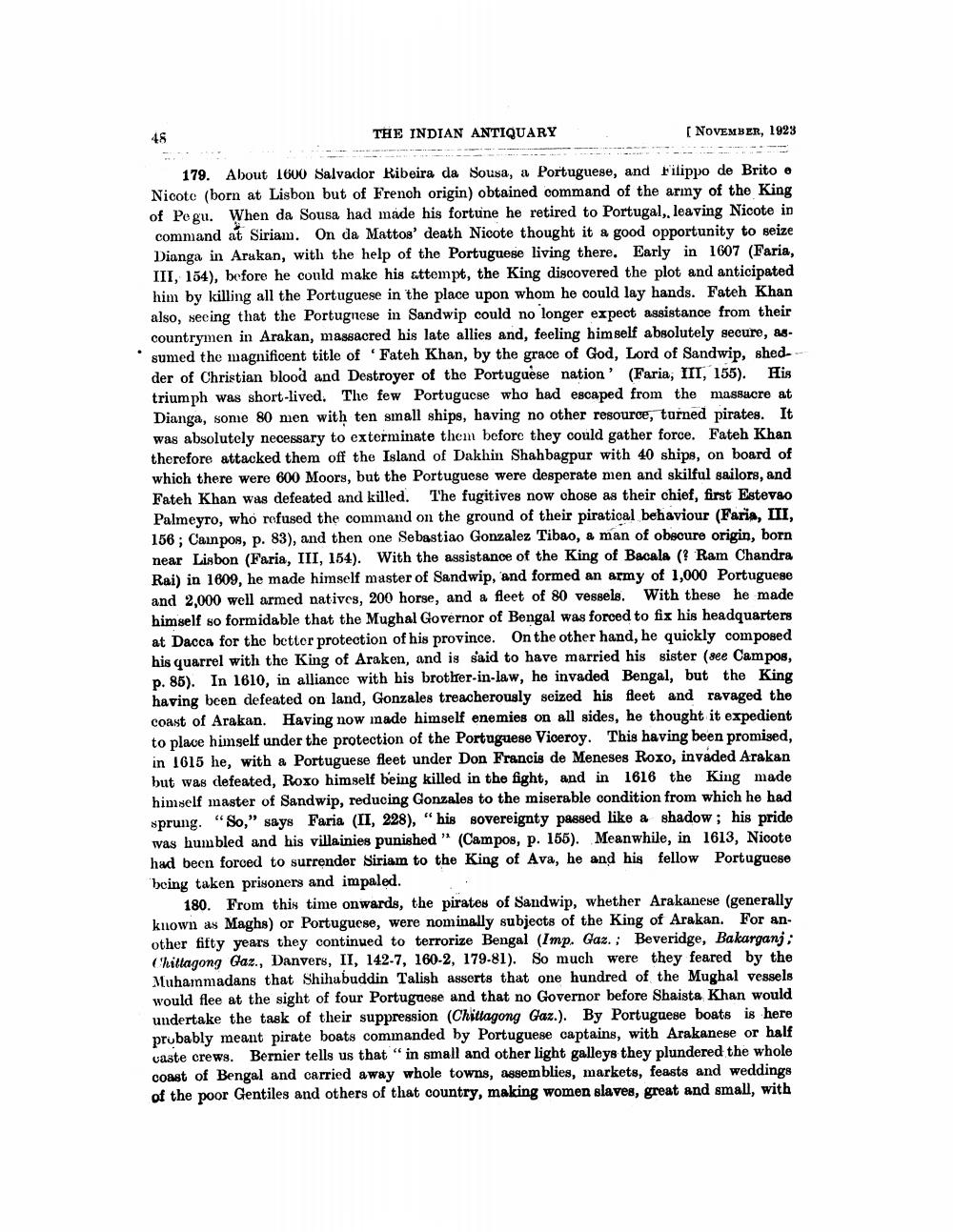________________
46
THE INDIAN ANTIQUARY
( NOVEMBER, 1923
179. About 1600 Salvador Ribeira da Sousa, a Portuguese, and Filippo de Brito o Nicote (born at Lisbon but of French origin) obtained command of the arıny of the King of Pegu. When da Sousa had made his fortune he retired to Portugal, leaving Nicote in command at Siriam. On da Mattos' death Nicote thought it a good opportunity to seize Dianga in Arakan, with the help of the Portuguese living there, Early in 1607 (Faria, III, 154), before he could make his attempt, the King discovered the plot and anticipated him by killing all the Portuguese in the place upon whom he could lay hands. Fateh Khan also, seeing that the Portugnese in Sandwip could no longer expect assistance from their countrymen in Arakan, massacred his late allies and, feeling himself absolutely secure, as sumed the magnificent title of Fateh Khan, by the grace of God, Lord of Sandwip, shed. der of Christian blood and Destroyer of the Portuguese nation' (Faria, III, 155). His triumph was short-lived. The few Portuguese who had escaped from the massacre at Dianga, some 80 men with ten small ships, having no other resource, turned pirates. It was absolutely necessary to exterminate them before they could gather force. Fateh Khan therefore attacked them off the Island of Dakhin Shahbagpur with 40 ships, on board of which there were 600 Moory, but the Portuguese were desperate men and skilful sailors, and Fateh Khan was defeated and killed. The fugitives now chose as their chief, first Estevao Palmeyro, who refused the command on the ground of their piratioal behaviour (Faris, III, 156; Campos, p. 83), and then one Sebastiao Gonzalez Tibao, a man of obscure origin, born near Lisbon (Faria, III, 154). With the assistance of the King of Bacala (? Ram Chandra Rai) in 1609, he made himself master of Sandwip, and formed an army of 1,000 Portuguese and 2,000 well armed natives, 200 horse, and a fleet of 80 vessels. With these he made himself so formidable that the Mughal Governor of Bengal was forced to fix his headquarters at Dacca for the better protection of his province. On the other hand, he quickly composed his quarrel with the King of Araken, and is said to have married his sister (see Campos, p. 85). In 1610, in alliance with his brother-in-law, he invaded Bengal, but the King having been defeated on land, Gonzales treacherously seized his fleet and ravaged the coast of Arakan. Having now made himself enemies on all sides, he thought it expedient to place himself under the protection of the Portuguese Viceroy. This having been promised, in 1615 he, with a Portuguese fleet under Don Francis de Meneses Roxo, invaded Arakan but was defeated, Roxo himself being killed in the fight, and in 1616 the King made himself master of Sandwip, reducing Gonzales to the miserable condition from which he had sprung. "So," says Faria (II, 228), “his sovereignty passed like a shadow; his pride was humbled and his villainies punished " (Campos, p. 155). Meanwhile, in 1613, Nicote had been forced to surrender Siriam to the King of Ava, he and his fellow Portuguese being taken prisoners and impaled.
180. From this time onwards, the pirates of Sandwip, whether Arakanese (generally kuown as Maghs) or Portuguese, were nominally subjects of the King of Arakan. For an. other fifty years they continued to terrorize Bengal (Imp. Gaz.; Beveridge, Bakarganj: Chittagong Gaz., Danvers, II, 142-7, 160-2, 179.81). So much were they feared by the Muhammadans that Shihabuddin Talish asserts that one hundred of the Mughal vessels would flee at the sight of four Portugaese and that no Governor before Shaista Khan would undertake the task of their suppression (Chittagong Gaz.). By Portuguese boats is here prubably meant pirate boats commanded by Portuguese captains, with Arakanese or half vaste crews. Bernier tells us that " in small and other light galleys they plundered the whole coast of Bengal and carried away whole towns, assemblies, markets, feasts and weddings of the poor Gentiles and others of that country, making women slaves, great and small, with




